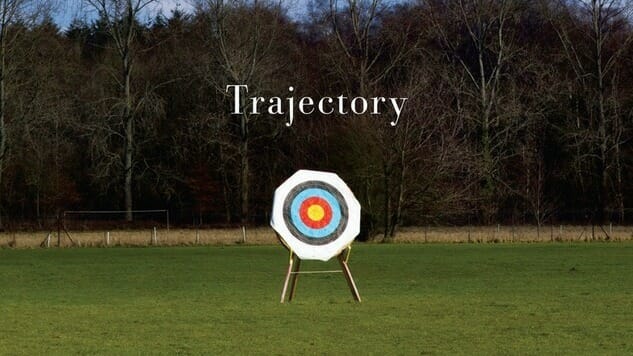Trajectory Marks Richard Russo’s Delightful Return to Short Stories and Academic Fiction

“If the depiction of lunacy happens to be your goal, academic life requires no embellishment.”
-Richard Russo, “How ‘I’ Moved Heaven and Earth”
For many readers, the genre-defining “academic novel” is David Lodge’s Small World. The book delivers a whirlwind tale of jet-setting elite, replete with classical references and jokes aimed at the real-life academic literati the novel satirizes.
Lodge’s literary conference circuit stands a world apart from the moribund mill towns of Richard Russo’s novels Nobody’s Fool and Empire Falls. One would hardly expect to find Lodge’s deconstructionist icon Morris Zapp talking horse racing with Richard Russo’s Donald “Sully” Sullivan in a dive bar. As such, academic novels and comical tales of blue-collar down-and-outers are unlikely to flow from the same writer’s pen. Any given author is only entitled to so much range and empathy, right?
Though academic jet-setters are hardly his métier, Russo has spent much of his adult life at universities. Alongside the enduring small-town epics with which he’s identified, Russo has carved out a parallel career writing insightful—and funny—campus novels and short stories. And his latest collection of short fiction returns him, in part, to the academic realm.
 Russo’s new book, Trajectory, is a collection of three substantial stories and a novella. “Voice,” previously published as the e-book-only novella Nate in Venice, introduces Nate Wilson, a just-retired English professor who joins his brother in Venice for a group tour of an art exhibit. Nate arrives still reeling from an incident involving a female student, which appears to have precipitated his hasty retirement. Still coming to terms with the knowledge that he chose the wrong career trajectory—academic life over his true calling, carpentry—Nate, like many of Russo’s academics, might seem more at home in a blue-collar town than academia, though he’s made choices that situate him in neither sphere.
Russo’s new book, Trajectory, is a collection of three substantial stories and a novella. “Voice,” previously published as the e-book-only novella Nate in Venice, introduces Nate Wilson, a just-retired English professor who joins his brother in Venice for a group tour of an art exhibit. Nate arrives still reeling from an incident involving a female student, which appears to have precipitated his hasty retirement. Still coming to terms with the knowledge that he chose the wrong career trajectory—academic life over his true calling, carpentry—Nate, like many of Russo’s academics, might seem more at home in a blue-collar town than academia, though he’s made choices that situate him in neither sphere.
“The Horseman” presents a young female professor beset by an undergraduate serial plagiarist, and her male colleagues are content to look the other way. She’s also contending with the haunting memory of a deceased grad school mentor of Morris Zapp-like stature who, years earlier, praised her ambition but accused her of absenting herself from her own work. “I can’t locate you anywhere,” he told her, dismissing a stack of her essays. “It’s as if you don’t exist.”
-

-

-

-

-

-

-

-

-

-

-

-

-

-

-

-

-

-

-

-

-

-

-

-

-

-

-

-

-

-

-

-

-

-

-

-

-

-

-

-








































